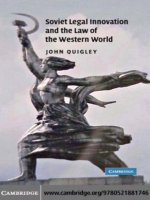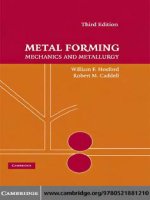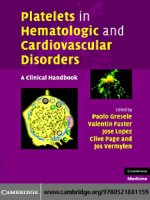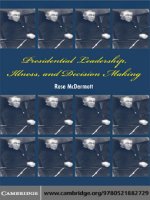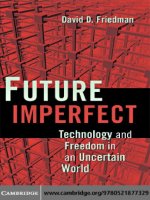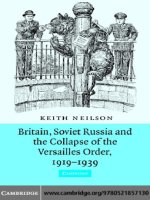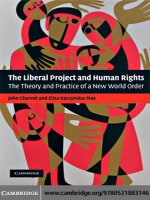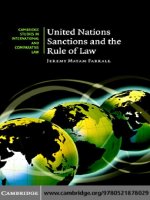0521621240 cambridge university press romantic atheism poetry and freethought 1780 1830 feb 2000
Bạn đang xem bản rút gọn của tài liệu. Xem và tải ngay bản đầy đủ của tài liệu tại đây (3.56 MB, 325 trang )
Romantic Atheism explores the links between English Romantic
poetry and the ®rst burst of outspoken atheism in Britain, from
the 1780s onwards. Martin Priestman examines the work of
Blake, Coleridge, Wordsworth, Shelley, Byron and Keats in
their most intellectually radical periods, establishing the depth
of their engagement with such discourses, and in some cases
their active participation. Equal attention is given to less
canonical writers: such poet-intellectuals as Erasmus Darwin,
Sir William Jones, Richard Payne Knight and Anna Laetitia
Barbauld, and controversialists including Holbach, Volney,
Paine, Priestley, Godwin, Richard Carlile and Eliza Sharples
(these last two in particular representing the close links between
punishably outspoken atheism and radical working-class politics). Above all, the book conveys the excitement of Romantic
atheism, whose dramatic appeals to new developments in
politics, science and comparative mythology lend it a protean
energy belied by the common and more recent conception of
`loss of faith'.
Martin Priestman is Reader in English at Roehampton Institute
London. He has also been a visiting Professor at Michigan State
University. His publications include Cowper's `Task': Structure and
In¯uence (1983), Detective Fiction and Literature: The Figure on the
Carpet (1990) and Crime Fiction from Poe to the Present (1998).
C A M B R I D G E S T U D I E S I N RO M A N T I C I S M 3 7
ROMANTIC ATHEISM
C A M B R I D G E S T U D I E S I N RO M A N T I C I S M 3 7
General editors
Professor Marilyn Butler
Professor James Chandler
University of Oxford
University of Chicago
Editorial board
John Barrell, University of York
Paul Hamilton, University of London
Mary Jacobus, Cornell University
Kenneth Johnston, Indiana University
Alan Liu, University of California, Santa Barbara
Jerome McGann, University of Virginia
David Simpson, University of California, Davis
This series aims to foster the best new work in one of the most challenging
®elds within English literary studies. From the early 1780s to the early 1830s
a formidable array of talented men and women took to literary composition, not just in poetry, which some of them famously transformed, but
in many modes of writing. The expansion of publishing created new
opportunities for writers, and the political stakes of what they wrote were
raised again by what Wordsworth called those `great national events' that
were `almost daily taking place': the French Revolution, the Napoleonic
and American wars, urbanization, industrialization, religious revival, an
expanded empire abroad and the reform movement at home. This was an
enormous ambition, even when it pretended otherwise. The relations
between science, philosophy, religion and literature were reworked in texts
such as Frankenstein and Biographia Literaria; gender relations in A Vindication
of the Rights of Woman and Don Juan; journalism by Cobbett and Hazlitt;
poetic form, content and style by the Lake School and the Cockney School.
Outside Shakespeare studies, probably no body of writing has produced
such a wealth of response or done so much to shape the responses of
modern criticism. This indeed is the period that saw the emergence of
those notions of `literature' and of literary history, especially national
literary history, on which modern scholarship in English has been founded.
The categories produced by Romanticism have also been challenged by
recent historicist arguments. The task of the series is to engage both with a
challenging corpus of Romantic writings and with the changing ®eld of
criticism they have helped to shape. As with other literary series published
by Cambridge, this one will represent the work of both younger and more
established scholars, on either side of the Atlantic and elsewhere.
For a complete list of titles published see end of book
The goddess Nature, frontispiece to Erasmus Darwin's The Temple of Nature (1803),
design by Henry Fuseli: `Shrin'd in the midst majestic NAT U R E stands, / Extends
o'er earth and sea her hundred hands; / Tower upon tower her beamy forehead
crests, / And births unnumber'd milk her hundred breasts' (I, 129±32).
ROMANTIC ATHEISM
Poetry and freethought, 1780±1830
MARTIN PRIESTMAN
The Pitt Building, Trumpington Street, Cambridge, United Kingdom
The Edinburgh Building, Cambridge CB2 2RU, UK
40 West 20th Street, New York, NY 10011-4211, USA
477 Williamstown Road, Port Melbourne, VIC 3207, Australia
Ruiz de Alarcón 13, 28014 Madrid, Spain
Dock House, The Waterfront, Cape Town 8001, South Africa
© Martin Priestman 2004
First published in printed format 2000
ISBN 0-511-01584-4 eBook (netLibrary)
ISBN 0-521-62124-0 hardback
For Nicki, with love and thanks
Contents
List of illustrations
Acknowledgements
page xii
xiii
Introduction
1
1 The atheism debate, 1780±1800
12
2 Masters of the universe: Lucretius, Sir William Jones,
Richard Payne Knight and Erasmus Darwin
44
3 And did those feet? Blake in the 1790s
80
4 The tribes of mind: the Coleridge circle in the 1790s
122
5 Whatsoe'er is dim and vast: Wordsworth in the 1790s
156
6 Temples of reason: atheist strategies, 1800±1830
184
7 Pretty paganism: the Shelley generation in the 1810s
219
Conclusion
253
Glossary of theological and other terms
Notes
Bibliography
Index
258
263
287
296
xi
Illustrations
The goddess Nature, frontispiece to Erasmus Darwin's The
Temple of Nature (London: J. Johnson, 1803), design by
Henry Fuseli. British Library (shelfmark 642. L. 17)
frontispiece
1. Astrological chart from front pages of C. F. C. Volney's
Ruins; or, The Revolutions of Empires (1791), reproduced
from 1826 edition (London: Thomas Tegg)
page 23
2. Plate II from Richard Payne Knight's A Discourse on
the Worship of Priapus, reproduced from Two Essays on
the Worship of Priapus (London: privately printed, 1865)
58
3. The `second compartment' of the Portland Vase, from
Erasmus Darwin's Economy of Vegetation (Additional Note
XXII, to II, 321). Copied from The Botanic Garden (1791),
opposite p. 54 of Additional Notes
72
4. Fertilization of Egypt, from Erasmus Darwin, Economy of
Vegetation, illustrating lines III, 129±34. Engraved by
William Blake from a design by Henry Fuseli. Copied
from The Botanic Garden (1791), opposite p. 127
103
5. `Astronomical' depictions of Mithras, plate 13 of
Sir William Drummond's Oedipus Judaicus (1811).
Copied from a later edition in the London Library
(London: Reeves and Turner, 1866)
194
6 a&b. George Cruikshank's woodcut The Clerical Magistrate,
from William Hone's The Political House that Jack Built
(London: William Hone, 1819); and A Priest, from the
anonymous retaliatory The Real or Constitutional House that
Jack Built (London: J. Asperne and W. Sams, 1819), 8th
edn. Copied from Radical Squibs and Loyal Ripostes:Satirical
Pamphlets of the Regency Period, 1819±1821, ed. Edgell
Rickword (Bath: Adams and Dart, 1971), pp. 55, 80
208±9
Except when otherwise stated, books copied from are in the author's
possession.
xii
Acknowledgements
First, I would like to thank my colleagues on the MA course in
`Literature and Politics, 1776±1832', at Roehampton Institute
London, from discussions with all of whom many key ideas for this
book emerged: Zachary Leader, Simon Edwards, Ian Haywood,
Susan Matthews, Kate Teltscher, Catherine Boyle and John Seed, to
the last of whom I owe a speci®c debt of thanks for the loan of books
and for drawing my attention to the importance of Unitarianism in
this period. I would also like to thank the British Library, the
London Library, Dr Williams's Library and the Libraries of Michigan State University, Sussex University and Roehampton Institute London, for enabling me to track down so many amazing texts.
Many thanks too to Mark Philp and Helen Kay; to Josie Dixon and
Hilary Hammond of Cambridge University Press; and to Marilyn
Butler for advice and encouragement. To my mother and to the
memories of my father and grandfather I owe incalculable debts
which include the privilege of a living sense of continuity with the
Quaker and Unitarian traditions of radical Dissent. By a lucky
chance I have been able to write most of this book with a good view
of two buildings in Lewes, Sussex, where these traditions are also
entwined: Tom Paine's house and the Unitarian Westgate Chapel
where his wife's grandfather was minister. I owe my greatest debt of
all to Nicola Humble, who let me have the room with the view and
without whose support, time and perceptiveness this book could not
have been written.
xiii
Introduction
The core idea of this book is simple: to explore the links between the
development of explicit atheism in the period 1780±1830 and the
simultaneous emergence of much important new poetry. There is no
single currently available book which aims to bring home to a
reasonably wide readership at once the vigour, ¯exibility, coherence
and popular appeal of anti-religious arguments from the late
eighteenth century to the early nineteenth, and the engagement in
or response to them of a signi®cant range of the poets of the time.
The emergence of declared atheism into common discourse has
been traced by such historians of ideas as J. M. Robertson, Iain
McCalman and David Berman, the last of whose A History of Atheism
in Britain from Hobbes to Russell (1988) dates `the birth of avowed
atheism' from 1782.1 Such histories of thought, however, have had
no particular brief to look at poetry as a special kind of discourse
and have hence overlooked it except when it transparently overlaps
with philosophy or polemic.
In literary studies, conversely, even some of these moments of
transparent overlap have tended to be overlooked: either the issue
has been avoided in various ways, or treated as obvious, or only
related to one or two writers at a time. As a topic, the full-bodied
presence of atheism in Romantic literature has been seen either as
barely conceivable or as somehow crudely beside the point, in a
context where `Romantic poetry' itself still constitutes a kind of
religion. To give a very rough thumbnail sketch of an old but widely
prevalent picture, the eighteenth century was an `age of prose and
reason', from which we were saved in the nick of time by the
`renaissance of wonder' which constituted Romanticism. It was, of
course, a single ism, so that whatever its more loquacious theorizers
(especially Wordsworth or Coleridge) had to say about it was true all
round. This generally had to do with rediscovering the truths of
1
2
Romantic atheism
religion through Nature or the Imagination, or else a particular
fusion of the two, to understand which was to be admitted to the
inner mysteries of `Romanticism'. Whether this reborn sense of
enchantment simply supplemented older forms of religion or replaced them with new ones was not always clear, but it was often
presented as an issue which would not even have occurred to the
poets themselves, rapt as they were in contemplating the wonders of
nature and the imaginative forays of their own minds.
Though their more explicitly unorthodox views on religion have
long been available, a nineteenth-century tradition of actively
suppressing these has remained powerful in shaping generalized
images of these writers. Some of these suppressions were by the
writers themselves, as in Wordsworth's withholding of many signi®cant early works from publication, as well as his endless selfrevisions, both of individual texts and his overall opus. Some
suppressions were by early publishers and editors, as with the family
pressures which prevented Mary Shelley from publishing her husband's works in any completeness until 1839. The tradition of
editorial suppression also continued in subtler forms: thus her
placing of the atheistic Queen Mab as the ®rst of Shelley's mature
works in 1839 was not followed in Thomas Hutchinson's 1907
standard Oxford edition, where it is to be found discreetly repositioned with his `Juvenilia' at the back.2 In this century, the greater
problem in assessing such unorthodox views has been the kind of
indifference sanctioned by entry to the canon: thus Wordsworth's
and Coleridge's `pantheism' has become a mildly idiosyncratic
variant of Christianity, and Blake's furious blasphemies just a
quaintly religious-minded way of putting things. There is also
perhaps the circular feeling that since this is what famous writers say,
this must be what people thought then, especially when these are the
main or only `people' we read from their period. For readers looking
for a more accurate positioning of these writers' ideas in their
context, there are many critical studies of the type which whisks one
off into the higher reaches of philosophical disquisition, assuming a
complete knowledge of the history of thought as a sine qua non for
understanding the given poet. What makes many excellent studies of
Romantic literature `suppressive' on the religious front is the lack of
a sense of shock, that these people said these things at this time. It is
partly to restore that sense of shock that this book foregrounds the
issue of `atheism' as central to the age; though to restore the sense of
Introduction
3
context, it positions it in relation to as many as possible of the softer
variants of unorthodoxy which are also essential to ®ll out the
picture.
Whether total or partial, the various kinds of editorial and critical
suppression discussed above played well to a readership attuned to
seek and ®nd in `Romanticism' a wide-eyed innocence on religious
matters. This might also be said about politics: indeed it is sometimes
hard to know whether religious or political unorthodoxy explains
any particular piece of textual suppression since they were often
hopelessly entwined in twin-barrelled assaults on `tyranny' and
`superstition'. Much comparatively recent criticism has worked hard
to restore the period's politics to our picture of its literature, and I
shall often lean gratefully on such studies in what follows. But,
except in a few cases, the religious debates which so intimately
accompanied this politics have either been sidelined as unpolitical,
or somewhat too readily assumed to be simply dictated by political
concerns, or else considered in the work of only one or two writers at
a time.
Three books from successive decades which have focussed attention on such religious issues across a range of writers, without
disregarding the political context, are M. H. Abrams's Natural Supernaturalism: Tradition and Revolution in Romantic Literature (1971), Marilyn
Butler's Romantics, Rebels and Reactionaries: English Literature and its
Background, 1760±1830 (1981) and Robert M. Ryan's The Romantic
Reformation (1997). In its title alone (borrowed from Thomas Carlyle),
Natural Supernaturalism implies a great deal of what I believe needs to
be said on the subject: that many `Romantic' writers use religious,
`supernatural' terminology to describe objects, experiences and
ideas which they know to be purely `natural', thus turning the
language of religion against itself by directing the feelings of
reverence and attachment it has traditionally demanded towards the
`world' it has traditionally downgraded. At a stroke, Abrams makes
impossible the simplistic move of estimating a particular poet's
degree of `religion' from a quick count of their biblical quotations:
depending on the context, such quotations may easily be polemically
placed to make us reapply learned religious responses to other
matters entirely.
The great ®rst example which launches his argument is Wordsworth's `Prospectus to The Recluse', whose description of a mental
¯ight past `Jehovah ± with his thunder, and the choir / Of shouting
4
Romantic atheism
angels' really conveys that `the heights and depths of the mind of
man are to replace heaven and hell'.3 In support of his position,
Abrams adduces a great many learned sources from Plotinus and
BoÈhme to Schelling and Kant, tending to demonstrate that a single
Neoplatonic philosophy provides `a ``key'' to the understanding of
Romanticism' (p. 169). Though on some level the materialist `nature'
of contemporary science is accepted as a basis for the shift from
orthodoxy, all the interest is on what one chapter calls `The
Redemptive Imagination'; and a series of other religious-sounding
chapter titles focusses our attention more on the perfect ®t made by
the new Romantic construct with the terms of the old one it
`replaces'. For Abrams, ultimately, Romanticism becomes the religion it has ousted.
Where Butler's Romantics, Rebels and Reactionaries is decisively
important is in the wedges she drives between different writers of the
period, as indicated in her title whose `and' opposes three groupings
to each other rather than con¯ating them in a single `ism'. In the
most dramatic of the consequent rearrangements, Coleridge is torn
away from his usual soul mate Wordsworth and even from being
de®ned primarily as a poet, to be juxtaposed with other rootless
`men of letters' including the group of German intellectuals, such as
Friedrich Schlegel, who ®rst constructed out of their disillusion with
politics and uncertainty as to their audience the whole idea of
`Romanticism' as something involving `an emotional, mystical,
irrational religiosity'.4 In his similar role as a Christian apologist,
Coleridge persuaded a later generation that such views were central
to his period's literature, but sharply differentiated himself from the
Enlightenment ideal of `Art for the People' through which another
chapter links his old comrade-in-arms Wordsworth with William
Blake. This latter pairing adds to its initial surprisingness by being
further related to the neoclassicism of revolutionary and `in®del'
France, thus dealing a further blow to the conventional opposition
between Enlightenment soullessness and the visionary Romanticism
of which Blake and Wordsworth/Coleridge are usually seen as
representing different but complementary strands.
While Butler juggles with many more themes than the religious
one, religion is a decisive reference point in her picture of the period
as one of active struggle between opposed points of view. In
particular, she foregrounds the existence of atheism as a possible
position, and the special importance of theories of mythology in
Introduction
5
articulating an `in®delity' which need not be shorn of exciting
imaginative content. If some proponents of these ideas, such as
Richard Payne Knight and Erasmus Darwin, play starring roles in
the present book, it is because of the interest initially roused by
coming across them in hers; indeed, more often than I have room to
acknowledge in detail, this book has found itself chasing hares
started by one or other of her crisp asides.
Though Butler's book gives a new focus for the idea of atheism as
a live issue across the whole range of `Romantic' writing, it does so
somewhat in passing as far as the poetry is concerned. Robert M.
Ryan's The Romantic Reformation: Religious Politics in English Literature
1789±1824 does focus almost entirely on the religious issues raised by
the major canonical poets of the period, though its title might
suggest a fundamentally different starting point from the present
study of `Romantic atheism'. This impression is partly con®rmed, in
that Ryan does attempt to demonstrate that ®ve of the `big six' poets,
Blake, Wordsworth, Byron, Keats and Shelley, were religious reformers at heart, with Coleridge taken as read and Shelley, the most
notoriously atheistic, saved till a triumphant last. In proving his case,
moreover, Ryan is not always free from the tendency which I earlier
suggested Abrams makes untenable, to brandish biblical allusions as
evidence of actual or incipient religious commitment.
However, there is more in his book that I agree than disagree
with, given that the word Reformation can be approached from either
side, as he acknowledges in a quotation from Edmund Burke to the
effect that `A man is certainly the most perfect Protestant who
protests against the whole Christian religion'.5 In this sense, I believe
all these poets were at times `Protestants', though not consistently so
(and perhaps, in Coleridge's case, with the attack directed at two
mutually exclusive `halves' of Christianity in turn). Ryan gives much
useful evidence of their far-reaching critiques of established religion,
and sets these in much the same political contexts as I shall. On
Keats in particular, where the problem is to establish any clear line
on the religious topics which Keats often deliberately avoids discussing in such terms, I have little if any disagreement with Ryan.
Where he demonstrates a poet's move back towards orthodoxy, this
is often in the context of later works, such as Wordsworth's The
Excursion and Blake's Jerusalem, which I happily cede to him, since my
book does not attempt to follow either poet past his more `in®del'
phase. Our difference is more a matter of emphasis: where he
6
Romantic atheism
presents a narrative of each poet's life in turn, with in®delism as the
®rst act and a healthier religious attitude as the last, I take it that
whatever their later settlements of their affairs, it is signi®cant
enough that most of these poets had an in®del phase, in which most
of their best work happened to be written.
To turn now to what this book does attempt to do, I shall use the
rest of this introduction to look at some crucial words, by whose
meanings and occasional ambiguities it is partly shaped. The
double-sidedness of the words Reformation and Protestant can also be
found lurking in the word religion itself: while writing the above, I
have been aware how often I have used the word religious when I
meant irreligious or atheistic. There is a large category problem in
discussing atheism, which is that it is assumed to `belong' to the
broader ®eld of religion: in libraries, books on the subject will
appear on the Religion shelves, if anywhere. This is not just because
a negative inevitably invokes its positive; it is because atheism
depends on religion to mean anything at all: if the latter simply went
away, so would the former. Hence the ease with which the vociferously atheist Shelley can be described as a religious poet; hence, too,
the paradox that the most thorough atheist of all might never
mention the fact, since for him or her both halves of the dualism
have already vanished. From within the shadow of such paradoxes,
however, it is still possible to assert that many people from the 1780s
to the 1820s attacked religion because they really did want to attack
religion, and believed there was something better.
One word often used to indicate that something better is humanism.
It is a word I do not use in this book because it carries too many
overlapping meanings, from classical scholarship to general benevolent humaneness, which either tend to construct their own argument
or else need persistent policing. But a belief in the power of, and
necessity for, humans to construct their own meanings out of the
known facts of nature rather than the unknowable postulates of
religion is common to many of the writers I shall be discussing and,
at some level, crucial to their work.
I can best start to indicate the range of issues and debates this
book will cover by expanding on the key terms of its title. The ®rst of
these terms, Romantic, denotes only a literary period, not the kind of
extractable essence I have criticized above. The often-used `Romantic period' is ungainly when used adjectivally, and the halfresigned inverted commas I have placed round the term up to now
Introduction
7
can be tiring to sustain. However, both in the title and in my
subsequent uses of the term, I use it to mean only the period later
thus labelled, not any shared intention by its writers to write in a
certain way.
The next word of the title, atheism, technically denotes the belief
that there is no God. My ®rst chapter demonstrates that this became
an expressible belief in Britain during the early Romantic period,
but I shall not be arguing that all the poets I discuss are atheists,
even when they challenge orthodox religion, as virtually all of them
do. I shall, however, argue that they were acutely aware of positive,
unapologetic atheism as a phenomenon of the time, and that most
had unorthodox moments or periods which they knew could easily
be accused of atheism, and that some did indeed participate in
aspects of atheist discourse. Until I have explored the nuances of
their very different positions further in the relevant chapters,
however, it is best to stress that the title indicates `atheism' as a topic,
an issue, a concern in the period called Romantic, rather than
indicating `Romantic atheism' as a belief system to which I somehow
need to prove all `Romantics' subscribed.
My next word, poetry, is clear enough, but it may raise the
question, why poetry, or why just poetry? I focus on it because,
unlike such multivocal forms as prose ®ction and drama, poetry has
an acknowledged responsibility to be af®rmative from a single
subject position, rather than as ®ltered through novels or plays
where the author's responsibility for any given utterance may be in
doubt ± admittedly, often usefully so where controversial ideas are
concerned. Of course the same might theoretically be said of poetry,
but it is nonetheless easier to tell when poets are taking risks or
refusing to do so, given the rush of directly engaging enthusiasm on
which so much poetry of the period depends. Tracking the atheist
possibility through poetry also gives a useful opportunity to restore
to a wider discursive context such mysti®ed `poetic' terms as Nature
and Imagination, the ®rst of which has a special resonance in atheist
book titles from the Roman poet Lucretius to the French philosophe
Baron d'Holbach as denoting the materialist alternative to God,
and the second of which can be interpreted as the right to invent
God or an acceptable substitute even if, in line with Voltaire's
dictum, he does not exist.
Given that the `atheism' of the main title denotes a dramatic topic
towards which the period's writers orientate themselves in different
8
Romantic atheism
ways, my subtitle uses the deliberately broader freethought, a term in
use from the earlier eighteenth century and allowing for a more
shifting range of positions, sharing a general refusal to submit the
reason to religious authority but ranging from committed atheism to
the `natural religion' of deism, and even to such `heretical' types of
Christianity as the Unitarianism and antinomianism espoused at times
by Coleridge and Blake respectively. In using this looser term, I am
not equating all freethinkers with `atheists', but drawing attention to
the interplay between that newly possible label and a more articulated range of terms which might also include in®del, sceptic, philosopher, materialist, enemy of superstition and priestcraft, Dissenter and theist.
While words near the top of the scale do virtually connote `atheist',
those further down could be used to connote strength or absence of
religious commitment, depending on the speaker, though in hostile
hands almost all are shadowed by the possibility that they may
conceal or lead towards atheism.
Having now related `freethought' to a range of further terms, I
shall brie¯y de®ne them here, referring readers also to the glossary
at the end of this book. Deism is the belief that the universe must
have had a broadly benevolent creator about whom, however, we
can know little more. Since we deduce his existence from the
evidence of nature, a virtual synonym for `deism' is `natural religion'.
As thus de®ned since the late seventeenth century, the word could be
variously used as perfectly compatible with Christianity or (as with
Thomas Paine) as violently opposed to it. Unitarianism was the
branch of `Dissenting' (i.e. non-Anglican) Christianity nearest to
deism, maintaining that Christ was purely human although sent by
God to convince us of his message through miracles, including the
resurrection. In rejecting the Trinity, Unitarians were theoretically
outside the law, the only Christian group whose doctrines were thus
actually proscribed except the Roman Catholics. As the leading
group of Rational Dissenters in our period, however, Unitarians were
immensely in¯uential in provoking the debates through which
atheism articulated itself, and in leading radical middle-class opposition to the government.
A less `rational' strain in non-Anglican Dissent was antinomianism
(i.e. `against the moral law'), a blanket term for a set of beliefs
involving the supersession of the authority of both the Old and New
Testaments by the immediate inspiration of some or all believers.
Ranging from Quakerism to the Swedenborgianism with which
Introduction
9
Blake was involved, such beliefs had roots in the upswelling of
independent religious groups in the seventeenth century, and were
often seen as forms of `Enthusiasm' appealing particularly to the
radical working classes. There were, however, overlaps with the
more middle-class `Rational Dissent', particularly in the millenarianism which greeted the French Revolution as a ful®lment of
prophecies of the overthrow of Babylon. In the chapter on Blake, I
shall also touch on the following: Behmenism, the engagement with
the writings of the sixteenth-century German mystic Jakob BoÈhme;
alchemy, presumed to be based on Egyptian theories of matter as
impregnated with various spiritual forces; Neoplatonism, the idea
derived from Plotinus and other followers of Plato that matter is
simply a trap for the spiritual; and Gnosticism, the heretically
Christian version of such ideas which sees the creator of matter as
lower than the ultimate God, and often as distinctly evil.
Of my further list of possible synonyms for `freethinker', in®del is
one of the most signi®cant. Meaning simply `non-believer (in what
the speaker believes in)', it virtually connotes `atheist' while being a
slightly easier label to accept for oneself: hence William Godwin
embraces the term while worrying about the `cold' connotations of
`atheist'. Unfortunately, the abstract noun in®delity has now come
predominantly to mean sexual cheating: otherwise, as the period's
commonest term for atheism, it should perhaps have featured in my
title. To continue with my list: scepticism is close to what we might
now call agnosticism, but with a harder edge to it. A sceptic will only
believe what can be proved: in particular, the philosopher David
Hume used this approach to discredit the deist belief in a creator
while refusing to back any alternative hypothesis, except ironically.
The word philosopher, meaning `lover of wisdom', could be neutral, as
when applied to scientists (`natural philosophers'), but could also
connote philosophe, the group of French thinkers including Voltaire,
Denis Diderot and Baron d'Holbach generally credited with an
undermining of religious authority throughout the eighteenth
century which eventually precipitated the French Revolution.
Several of these, such as d'Holbach, were committed materialists, who
believed with the Greek philosopher Epicurus and Roman poet
Lucretius that the universe consisted purely of matter, animated by
its own energies and needing no external divine input.
Of the last few words on the list, priestcraft and superstition were
often yoked together as things the speaker expects every reasonable
10
Romantic atheism
person to be opposed to, and usually ostensibly denote Roman
Catholicism. `Superstition' is clearly any form of irrational belief;
`priestcraft' implies a whole theory of religion being used as a pretext
to seize ideological and real power. The beauty of these two
extremely prevalent words was that it was impossible to tell exactly
where the attack stopped: at Catholicism alone, or at any form of
imposed `state religion', including the Church of England, or even at
Christianity itself ? The last word, theist, is usefully open-ended:
theoretically meaning simply `believer in God', it could in practice
range from the most orthodox upholder of revelation to the most
minimal deist. One ®nal word I should explain my use of before
concluding is orthodox, not in the above list but virtually unavoidable
as the opposite term to most of those discussed in this book.
Meaning simply `adhering to the established doctrines', it is an
inherently spongy term, dependent on how broadly or narrowly one
reads those established doctrines. Clearly belief in God and the
Thirty-Nine Articles were both `orthodox' at the time, but the
former does not necessarily imply the latter: it depends on the
context of the debate.
A great many of these words feature in the following chapter, `The
atheism debate', which demonstrates, I hope, the crucial importance
of `atheism' itself ± both the word and the thing it denotes ± in the
period from 1780 to 1800. As an occasional daringly-adopted badge,
or more often as a veiled or open accusation, it vies for importance
in the collective mind with the French Revolution itself, with whose
fortunes it was to become indissolubly linked. In the chapters that
follow, my focus on particular canonical poets is only ever half the
point: just as important is an attempt to crowd the canvas with other
writers or with the viewpoints which give them context. If in some
ways this book's preoccupation with religious debates may seem to
narrow unduly the focus of what it discusses, in other ways I hope it
widens it beyond the still-prevalent critical obsession with too small a
range of `great writers'. These issues touched everybody; religious
and/or in®del discourses provided the channels much else ran in,
from theories of political change to theories of mythological poetry
to theories of gender to theories of science. These four areas are
taken up in a more polemical context again in chapter 6, which
considers where the atheism debate had got to between 1800 and
1830, if debate continues to be the word for a situation dominated by
legal repression and various forms of retaliation. The ®nal chapter

